Business Law: Contract Breach and Exclusion Clause Analysis
VerifiedAdded on 2023/02/01
|7
|1552
|50
Homework Assignment
AI Summary
This business law assignment analyzes a case involving Xena selling land to Hercules, exploring issues of offer and acceptance, breach of contract, and exclusion clauses. The assignment examines whether Hercules's acceptance of the offer was valid, considering the specified method of acceptance. It further investigates whether Hercules can claim damages from a mechanic (HM) for a breach of contract due to delayed car repairs, which caused him to miss a contract. The assignment also analyzes the enforceability of an exclusion clause in the contract between Hercules and HM, considering relevant legal principles and case precedents. The analysis includes the application of rules regarding damages and the validity of exclusion clauses within the context of contract law and consumer protection laws, referencing key legal cases to support the arguments.
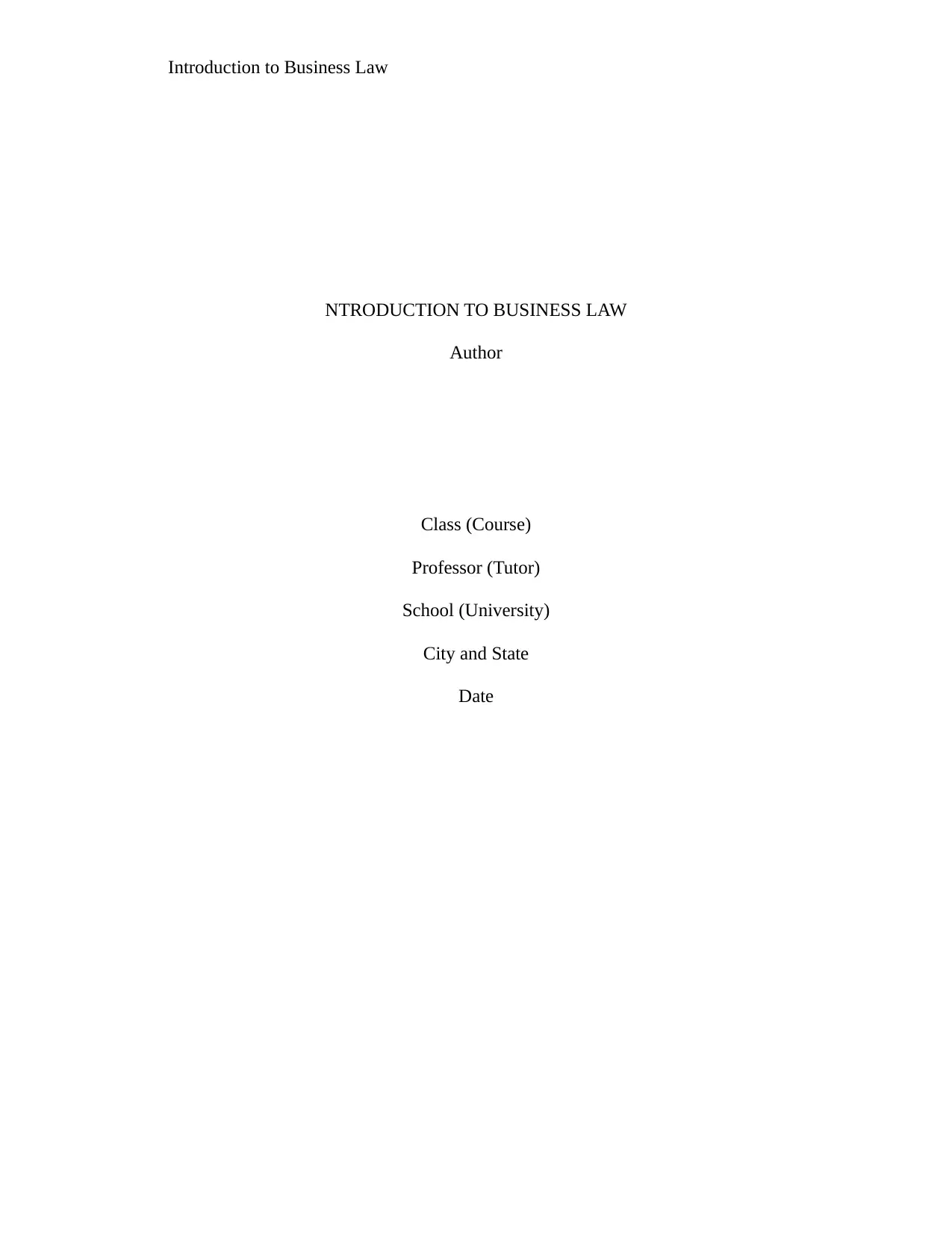
Introduction to Business Law
NTRODUCTION TO BUSINESS LAW
Author
Class (Course)
Professor (Tutor)
School (University)
City and State
Date
NTRODUCTION TO BUSINESS LAW
Author
Class (Course)
Professor (Tutor)
School (University)
City and State
Date
Paraphrase This Document
Need a fresh take? Get an instant paraphrase of this document with our AI Paraphraser
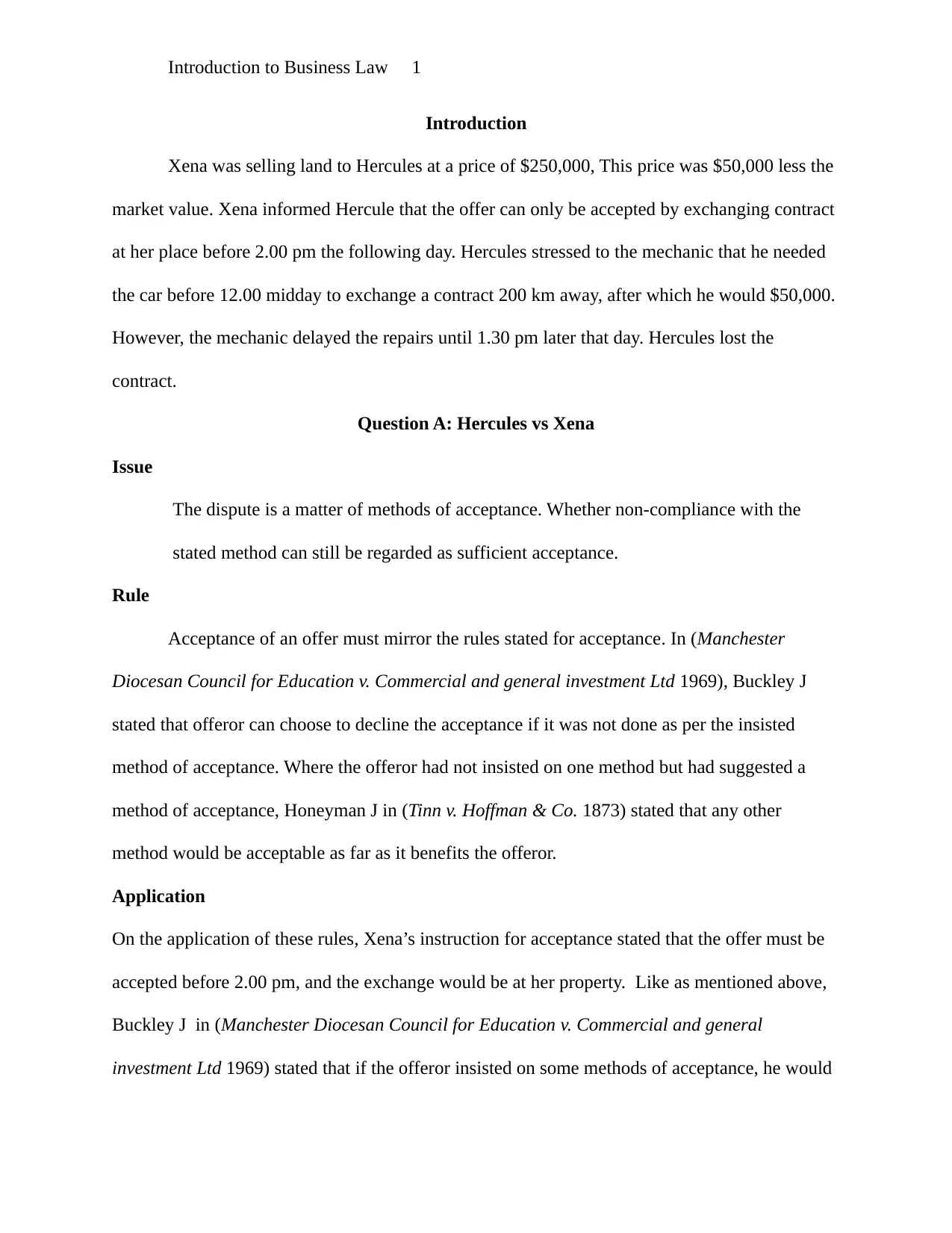
Introduction to Business Law 1
Introduction
Xena was selling land to Hercules at a price of $250,000, This price was $50,000 less the
market value. Xena informed Hercule that the offer can only be accepted by exchanging contract
at her place before 2.00 pm the following day. Hercules stressed to the mechanic that he needed
the car before 12.00 midday to exchange a contract 200 km away, after which he would $50,000.
However, the mechanic delayed the repairs until 1.30 pm later that day. Hercules lost the
contract.
Question A: Hercules vs Xena
Issue
The dispute is a matter of methods of acceptance. Whether non-compliance with the
stated method can still be regarded as sufficient acceptance.
Rule
Acceptance of an offer must mirror the rules stated for acceptance. In (Manchester
Diocesan Council for Education v. Commercial and general investment Ltd 1969), Buckley J
stated that offeror can choose to decline the acceptance if it was not done as per the insisted
method of acceptance. Where the offeror had not insisted on one method but had suggested a
method of acceptance, Honeyman J in (Tinn v. Hoffman & Co. 1873) stated that any other
method would be acceptable as far as it benefits the offeror.
Application
On the application of these rules, Xena’s instruction for acceptance stated that the offer must be
accepted before 2.00 pm, and the exchange would be at her property. Like as mentioned above,
Buckley J in (Manchester Diocesan Council for Education v. Commercial and general
investment Ltd 1969) stated that if the offeror insisted on some methods of acceptance, he would
Introduction
Xena was selling land to Hercules at a price of $250,000, This price was $50,000 less the
market value. Xena informed Hercule that the offer can only be accepted by exchanging contract
at her place before 2.00 pm the following day. Hercules stressed to the mechanic that he needed
the car before 12.00 midday to exchange a contract 200 km away, after which he would $50,000.
However, the mechanic delayed the repairs until 1.30 pm later that day. Hercules lost the
contract.
Question A: Hercules vs Xena
Issue
The dispute is a matter of methods of acceptance. Whether non-compliance with the
stated method can still be regarded as sufficient acceptance.
Rule
Acceptance of an offer must mirror the rules stated for acceptance. In (Manchester
Diocesan Council for Education v. Commercial and general investment Ltd 1969), Buckley J
stated that offeror can choose to decline the acceptance if it was not done as per the insisted
method of acceptance. Where the offeror had not insisted on one method but had suggested a
method of acceptance, Honeyman J in (Tinn v. Hoffman & Co. 1873) stated that any other
method would be acceptable as far as it benefits the offeror.
Application
On the application of these rules, Xena’s instruction for acceptance stated that the offer must be
accepted before 2.00 pm, and the exchange would be at her property. Like as mentioned above,
Buckley J in (Manchester Diocesan Council for Education v. Commercial and general
investment Ltd 1969) stated that if the offeror insisted on some methods of acceptance, he would
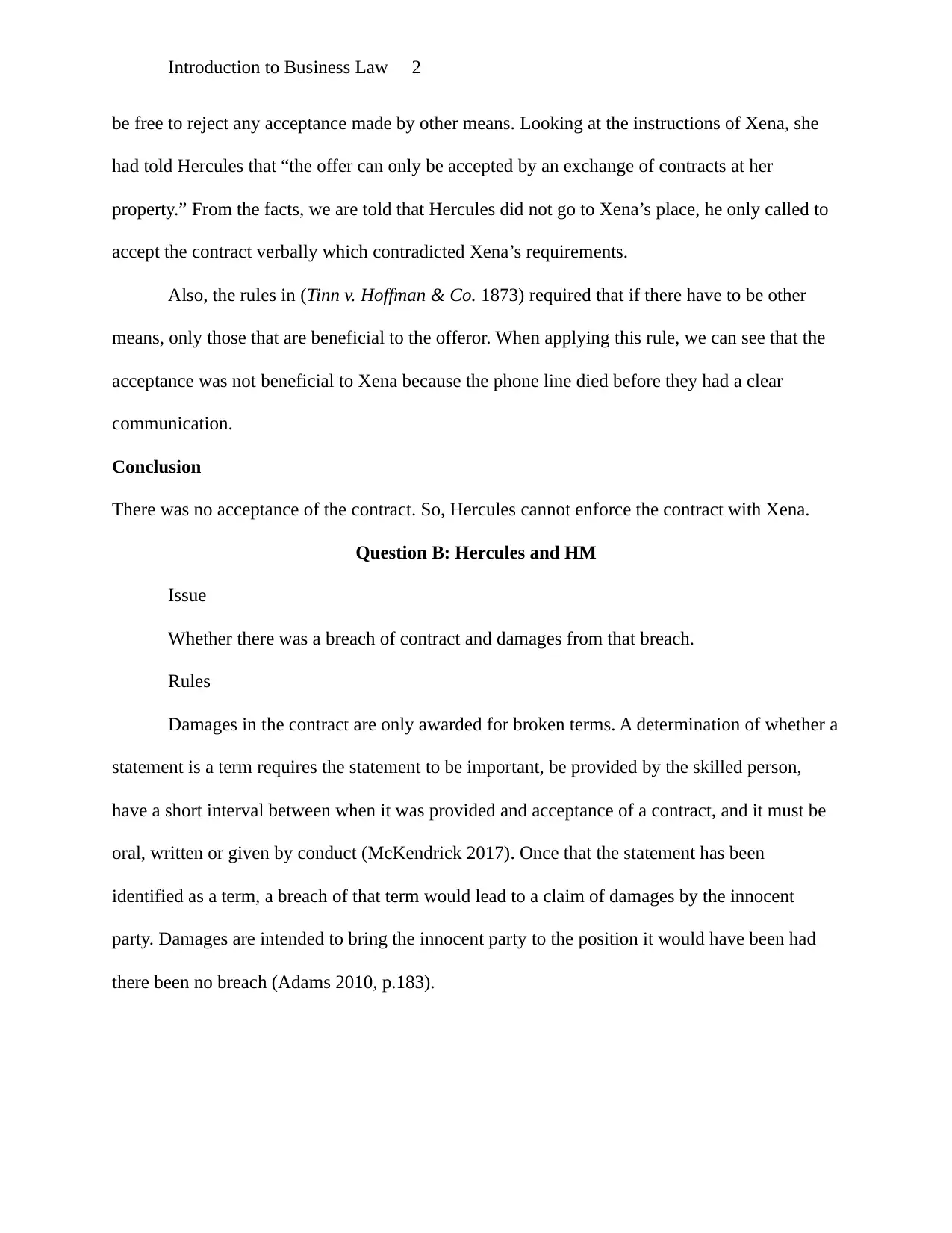
Introduction to Business Law 2
be free to reject any acceptance made by other means. Looking at the instructions of Xena, she
had told Hercules that “the offer can only be accepted by an exchange of contracts at her
property.” From the facts, we are told that Hercules did not go to Xena’s place, he only called to
accept the contract verbally which contradicted Xena’s requirements.
Also, the rules in (Tinn v. Hoffman & Co. 1873) required that if there have to be other
means, only those that are beneficial to the offeror. When applying this rule, we can see that the
acceptance was not beneficial to Xena because the phone line died before they had a clear
communication.
Conclusion
There was no acceptance of the contract. So, Hercules cannot enforce the contract with Xena.
Question B: Hercules and HM
Issue
Whether there was a breach of contract and damages from that breach.
Rules
Damages in the contract are only awarded for broken terms. A determination of whether a
statement is a term requires the statement to be important, be provided by the skilled person,
have a short interval between when it was provided and acceptance of a contract, and it must be
oral, written or given by conduct (McKendrick 2017). Once that the statement has been
identified as a term, a breach of that term would lead to a claim of damages by the innocent
party. Damages are intended to bring the innocent party to the position it would have been had
there been no breach (Adams 2010, p.183).
be free to reject any acceptance made by other means. Looking at the instructions of Xena, she
had told Hercules that “the offer can only be accepted by an exchange of contracts at her
property.” From the facts, we are told that Hercules did not go to Xena’s place, he only called to
accept the contract verbally which contradicted Xena’s requirements.
Also, the rules in (Tinn v. Hoffman & Co. 1873) required that if there have to be other
means, only those that are beneficial to the offeror. When applying this rule, we can see that the
acceptance was not beneficial to Xena because the phone line died before they had a clear
communication.
Conclusion
There was no acceptance of the contract. So, Hercules cannot enforce the contract with Xena.
Question B: Hercules and HM
Issue
Whether there was a breach of contract and damages from that breach.
Rules
Damages in the contract are only awarded for broken terms. A determination of whether a
statement is a term requires the statement to be important, be provided by the skilled person,
have a short interval between when it was provided and acceptance of a contract, and it must be
oral, written or given by conduct (McKendrick 2017). Once that the statement has been
identified as a term, a breach of that term would lead to a claim of damages by the innocent
party. Damages are intended to bring the innocent party to the position it would have been had
there been no breach (Adams 2010, p.183).
⊘ This is a preview!⊘
Do you want full access?
Subscribe today to unlock all pages.

Trusted by 1+ million students worldwide
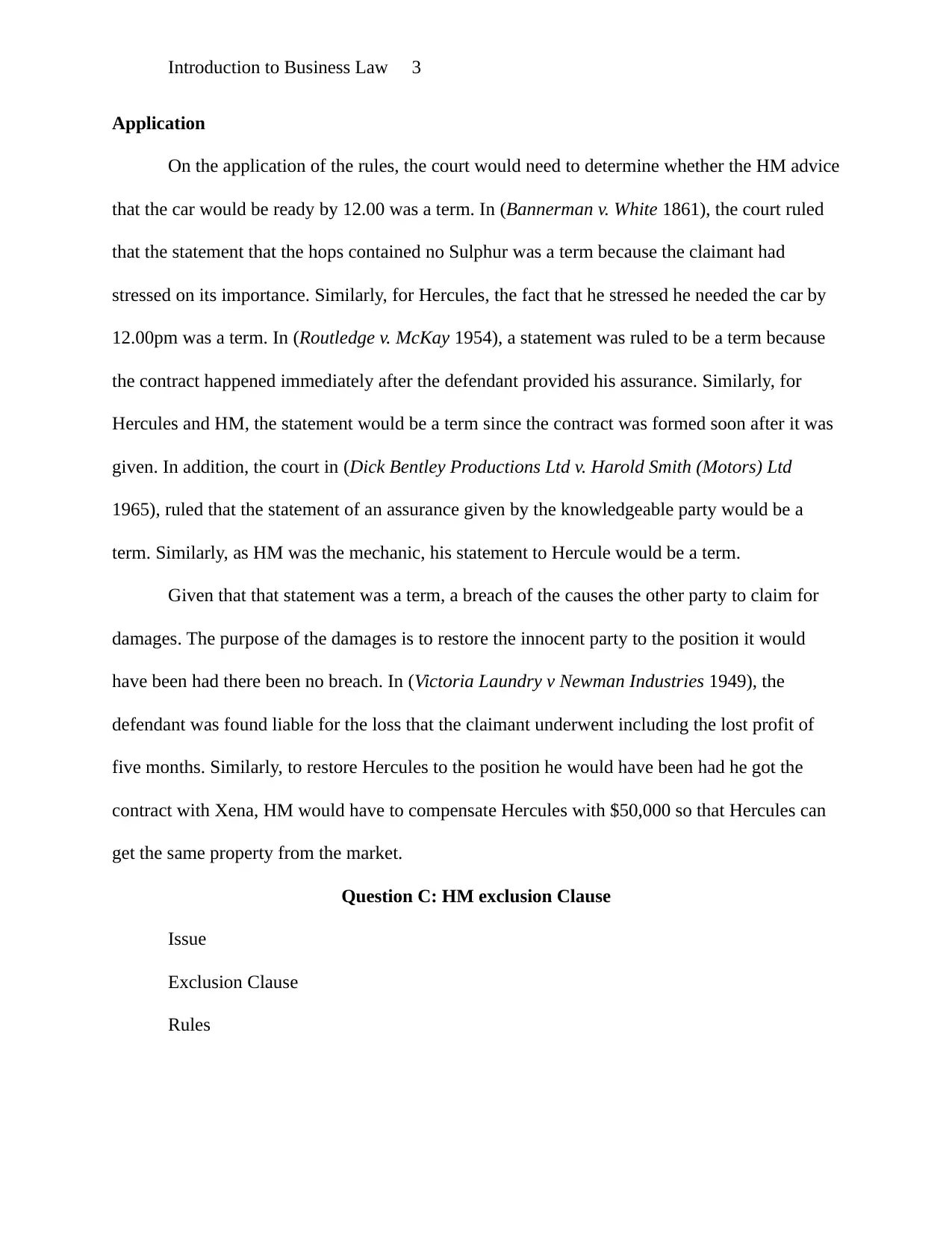
Introduction to Business Law 3
Application
On the application of the rules, the court would need to determine whether the HM advice
that the car would be ready by 12.00 was a term. In (Bannerman v. White 1861), the court ruled
that the statement that the hops contained no Sulphur was a term because the claimant had
stressed on its importance. Similarly, for Hercules, the fact that he stressed he needed the car by
12.00pm was a term. In (Routledge v. McKay 1954), a statement was ruled to be a term because
the contract happened immediately after the defendant provided his assurance. Similarly, for
Hercules and HM, the statement would be a term since the contract was formed soon after it was
given. In addition, the court in (Dick Bentley Productions Ltd v. Harold Smith (Motors) Ltd
1965), ruled that the statement of an assurance given by the knowledgeable party would be a
term. Similarly, as HM was the mechanic, his statement to Hercule would be a term.
Given that that statement was a term, a breach of the causes the other party to claim for
damages. The purpose of the damages is to restore the innocent party to the position it would
have been had there been no breach. In (Victoria Laundry v Newman Industries 1949), the
defendant was found liable for the loss that the claimant underwent including the lost profit of
five months. Similarly, to restore Hercules to the position he would have been had he got the
contract with Xena, HM would have to compensate Hercules with $50,000 so that Hercules can
get the same property from the market.
Question C: HM exclusion Clause
Issue
Exclusion Clause
Rules
Application
On the application of the rules, the court would need to determine whether the HM advice
that the car would be ready by 12.00 was a term. In (Bannerman v. White 1861), the court ruled
that the statement that the hops contained no Sulphur was a term because the claimant had
stressed on its importance. Similarly, for Hercules, the fact that he stressed he needed the car by
12.00pm was a term. In (Routledge v. McKay 1954), a statement was ruled to be a term because
the contract happened immediately after the defendant provided his assurance. Similarly, for
Hercules and HM, the statement would be a term since the contract was formed soon after it was
given. In addition, the court in (Dick Bentley Productions Ltd v. Harold Smith (Motors) Ltd
1965), ruled that the statement of an assurance given by the knowledgeable party would be a
term. Similarly, as HM was the mechanic, his statement to Hercule would be a term.
Given that that statement was a term, a breach of the causes the other party to claim for
damages. The purpose of the damages is to restore the innocent party to the position it would
have been had there been no breach. In (Victoria Laundry v Newman Industries 1949), the
defendant was found liable for the loss that the claimant underwent including the lost profit of
five months. Similarly, to restore Hercules to the position he would have been had he got the
contract with Xena, HM would have to compensate Hercules with $50,000 so that Hercules can
get the same property from the market.
Question C: HM exclusion Clause
Issue
Exclusion Clause
Rules
Paraphrase This Document
Need a fresh take? Get an instant paraphrase of this document with our AI Paraphraser
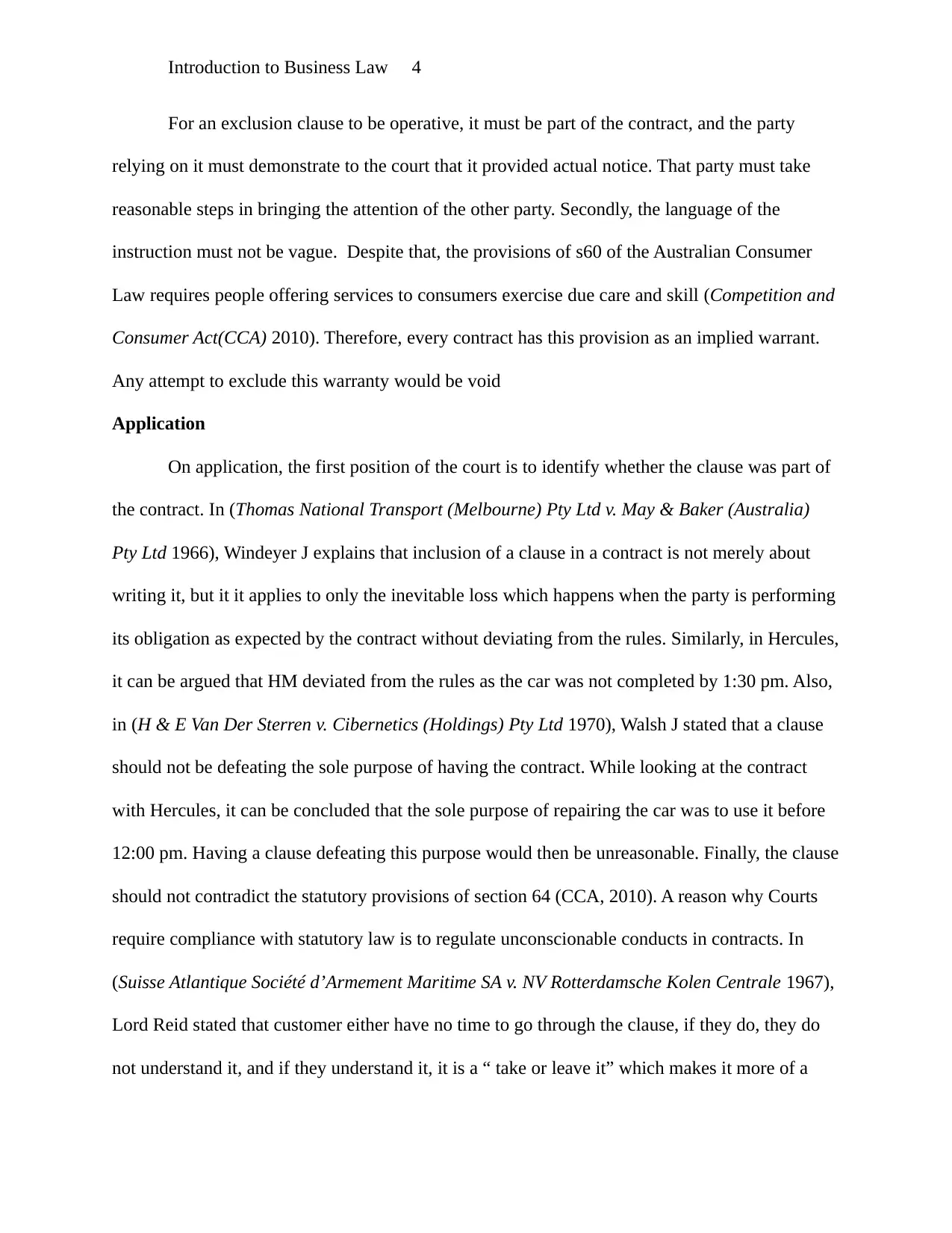
Introduction to Business Law 4
For an exclusion clause to be operative, it must be part of the contract, and the party
relying on it must demonstrate to the court that it provided actual notice. That party must take
reasonable steps in bringing the attention of the other party. Secondly, the language of the
instruction must not be vague. Despite that, the provisions of s60 of the Australian Consumer
Law requires people offering services to consumers exercise due care and skill (Competition and
Consumer Act(CCA) 2010). Therefore, every contract has this provision as an implied warrant.
Any attempt to exclude this warranty would be void
Application
On application, the first position of the court is to identify whether the clause was part of
the contract. In (Thomas National Transport (Melbourne) Pty Ltd v. May & Baker (Australia)
Pty Ltd 1966), Windeyer J explains that inclusion of a clause in a contract is not merely about
writing it, but it it applies to only the inevitable loss which happens when the party is performing
its obligation as expected by the contract without deviating from the rules. Similarly, in Hercules,
it can be argued that HM deviated from the rules as the car was not completed by 1:30 pm. Also,
in (H & E Van Der Sterren v. Cibernetics (Holdings) Pty Ltd 1970), Walsh J stated that a clause
should not be defeating the sole purpose of having the contract. While looking at the contract
with Hercules, it can be concluded that the sole purpose of repairing the car was to use it before
12:00 pm. Having a clause defeating this purpose would then be unreasonable. Finally, the clause
should not contradict the statutory provisions of section 64 (CCA, 2010). A reason why Courts
require compliance with statutory law is to regulate unconscionable conducts in contracts. In
(Suisse Atlantique Société d’Armement Maritime SA v. NV Rotterdamsche Kolen Centrale 1967),
Lord Reid stated that customer either have no time to go through the clause, if they do, they do
not understand it, and if they understand it, it is a “ take or leave it” which makes it more of a
For an exclusion clause to be operative, it must be part of the contract, and the party
relying on it must demonstrate to the court that it provided actual notice. That party must take
reasonable steps in bringing the attention of the other party. Secondly, the language of the
instruction must not be vague. Despite that, the provisions of s60 of the Australian Consumer
Law requires people offering services to consumers exercise due care and skill (Competition and
Consumer Act(CCA) 2010). Therefore, every contract has this provision as an implied warrant.
Any attempt to exclude this warranty would be void
Application
On application, the first position of the court is to identify whether the clause was part of
the contract. In (Thomas National Transport (Melbourne) Pty Ltd v. May & Baker (Australia)
Pty Ltd 1966), Windeyer J explains that inclusion of a clause in a contract is not merely about
writing it, but it it applies to only the inevitable loss which happens when the party is performing
its obligation as expected by the contract without deviating from the rules. Similarly, in Hercules,
it can be argued that HM deviated from the rules as the car was not completed by 1:30 pm. Also,
in (H & E Van Der Sterren v. Cibernetics (Holdings) Pty Ltd 1970), Walsh J stated that a clause
should not be defeating the sole purpose of having the contract. While looking at the contract
with Hercules, it can be concluded that the sole purpose of repairing the car was to use it before
12:00 pm. Having a clause defeating this purpose would then be unreasonable. Finally, the clause
should not contradict the statutory provisions of section 64 (CCA, 2010). A reason why Courts
require compliance with statutory law is to regulate unconscionable conducts in contracts. In
(Suisse Atlantique Société d’Armement Maritime SA v. NV Rotterdamsche Kolen Centrale 1967),
Lord Reid stated that customer either have no time to go through the clause, if they do, they do
not understand it, and if they understand it, it is a “ take or leave it” which makes it more of a
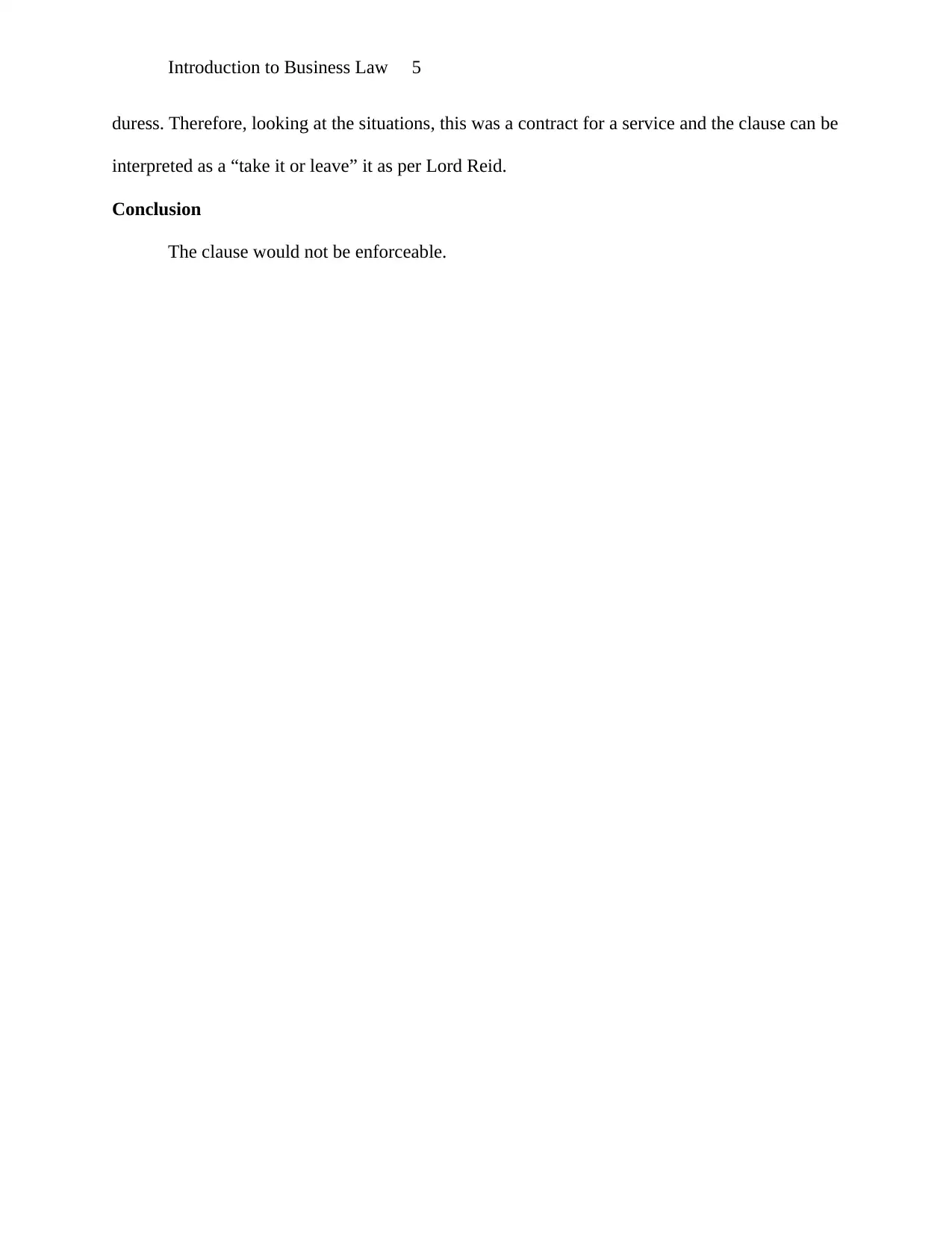
Introduction to Business Law 5
duress. Therefore, looking at the situations, this was a contract for a service and the clause can be
interpreted as a “take it or leave” it as per Lord Reid.
Conclusion
The clause would not be enforceable.
duress. Therefore, looking at the situations, this was a contract for a service and the clause can be
interpreted as a “take it or leave” it as per Lord Reid.
Conclusion
The clause would not be enforceable.
⊘ This is a preview!⊘
Do you want full access?
Subscribe today to unlock all pages.

Trusted by 1+ million students worldwide
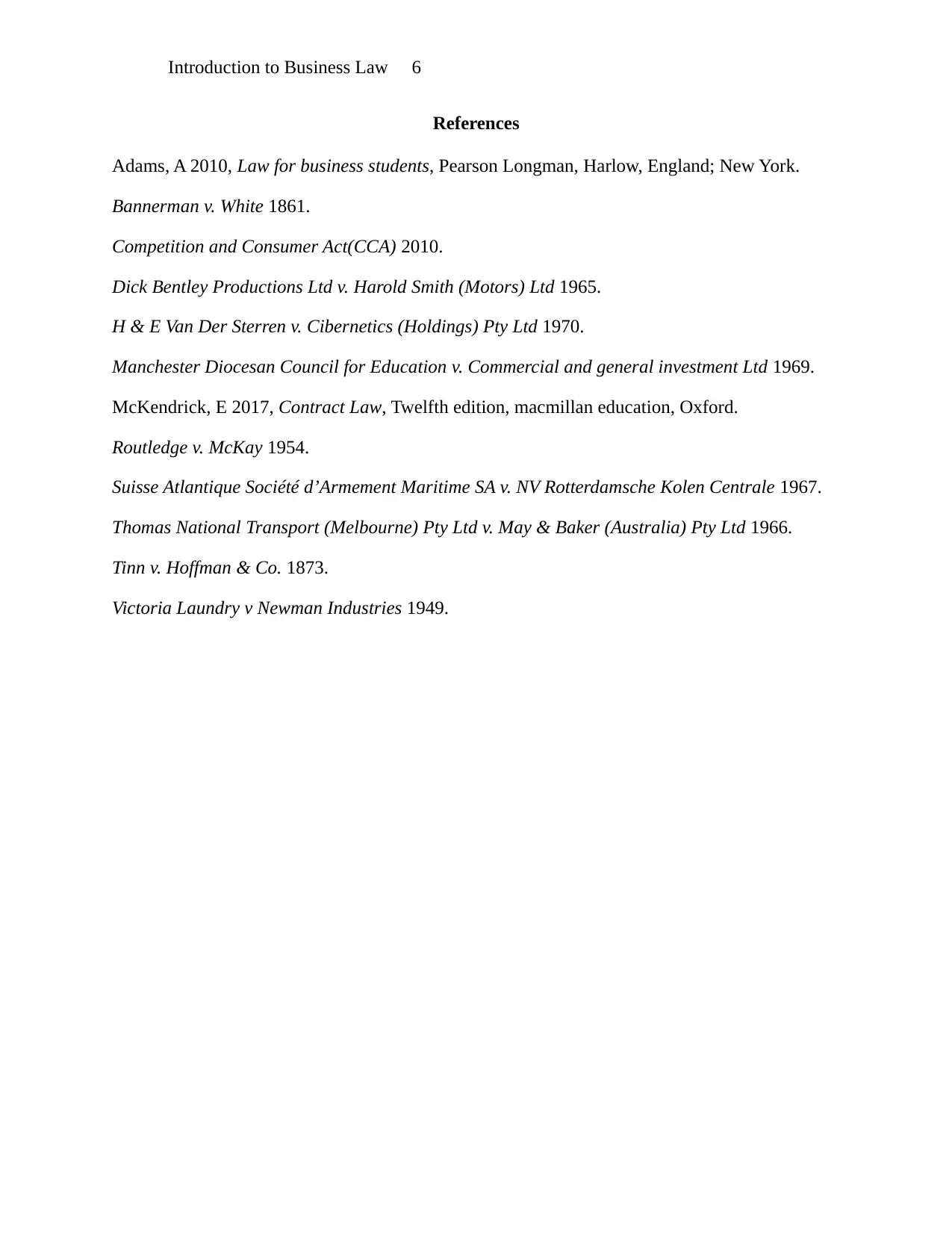
Introduction to Business Law 6
References
Adams, A 2010, Law for business students, Pearson Longman, Harlow, England; New York.
Bannerman v. White 1861.
Competition and Consumer Act(CCA) 2010.
Dick Bentley Productions Ltd v. Harold Smith (Motors) Ltd 1965.
H & E Van Der Sterren v. Cibernetics (Holdings) Pty Ltd 1970.
Manchester Diocesan Council for Education v. Commercial and general investment Ltd 1969.
McKendrick, E 2017, Contract Law, Twelfth edition, macmillan education, Oxford.
Routledge v. McKay 1954.
Suisse Atlantique Société d’Armement Maritime SA v. NV Rotterdamsche Kolen Centrale 1967.
Thomas National Transport (Melbourne) Pty Ltd v. May & Baker (Australia) Pty Ltd 1966.
Tinn v. Hoffman & Co. 1873.
Victoria Laundry v Newman Industries 1949.
References
Adams, A 2010, Law for business students, Pearson Longman, Harlow, England; New York.
Bannerman v. White 1861.
Competition and Consumer Act(CCA) 2010.
Dick Bentley Productions Ltd v. Harold Smith (Motors) Ltd 1965.
H & E Van Der Sterren v. Cibernetics (Holdings) Pty Ltd 1970.
Manchester Diocesan Council for Education v. Commercial and general investment Ltd 1969.
McKendrick, E 2017, Contract Law, Twelfth edition, macmillan education, Oxford.
Routledge v. McKay 1954.
Suisse Atlantique Société d’Armement Maritime SA v. NV Rotterdamsche Kolen Centrale 1967.
Thomas National Transport (Melbourne) Pty Ltd v. May & Baker (Australia) Pty Ltd 1966.
Tinn v. Hoffman & Co. 1873.
Victoria Laundry v Newman Industries 1949.
1 out of 7
Related Documents
Your All-in-One AI-Powered Toolkit for Academic Success.
+13062052269
info@desklib.com
Available 24*7 on WhatsApp / Email
![[object Object]](/_next/static/media/star-bottom.7253800d.svg)
Unlock your academic potential
Copyright © 2020–2025 A2Z Services. All Rights Reserved. Developed and managed by ZUCOL.




